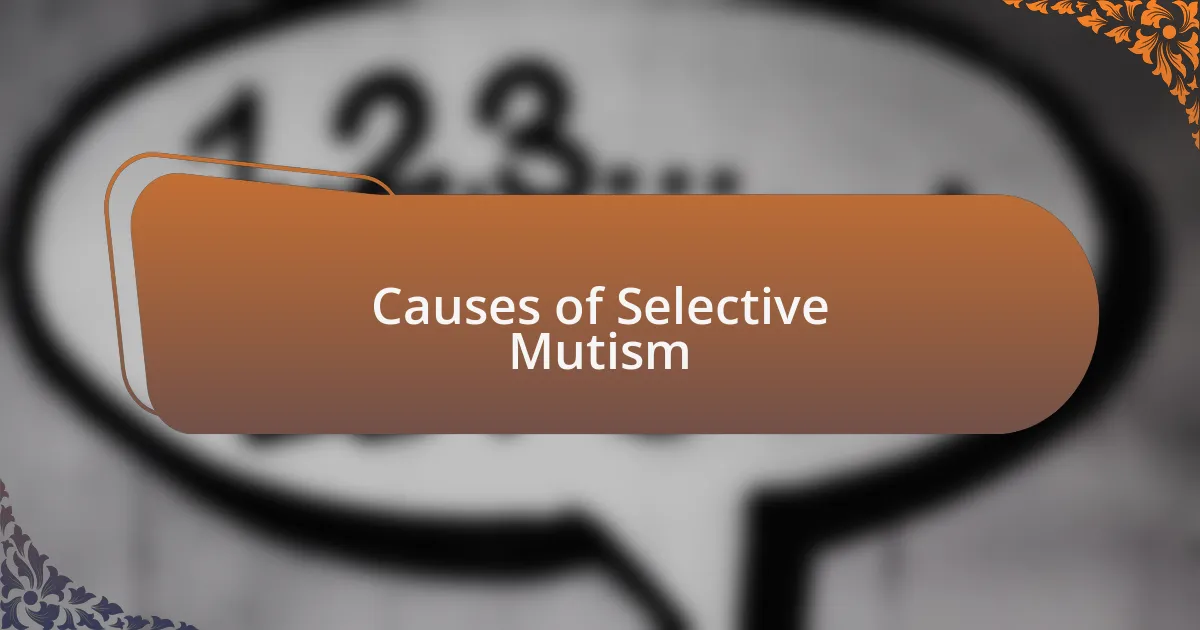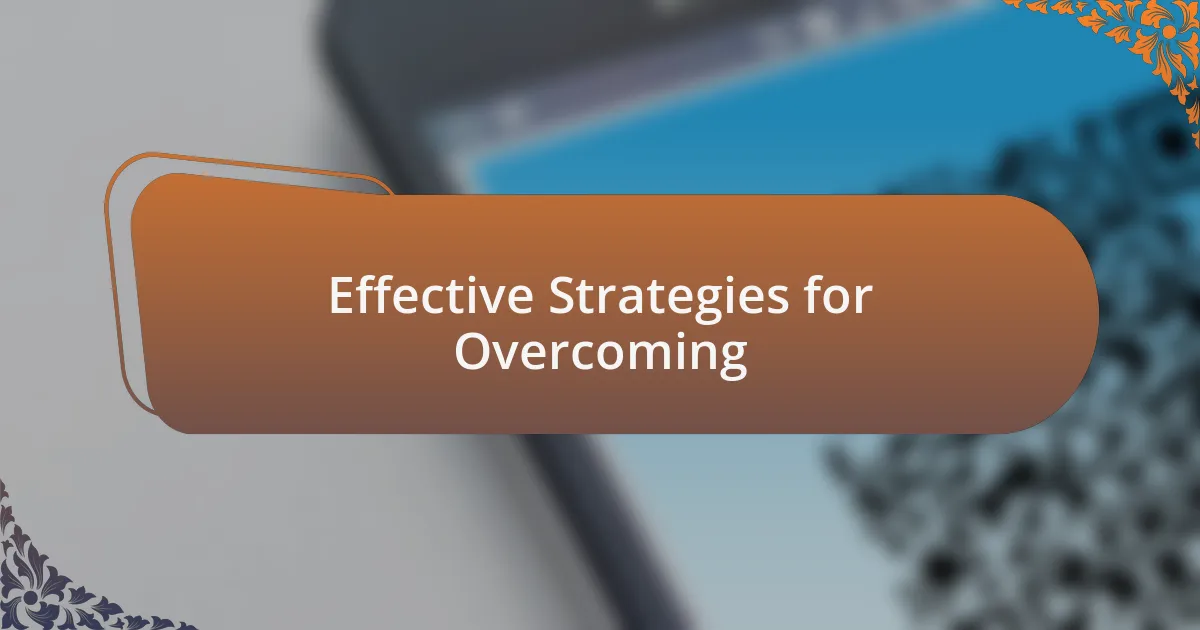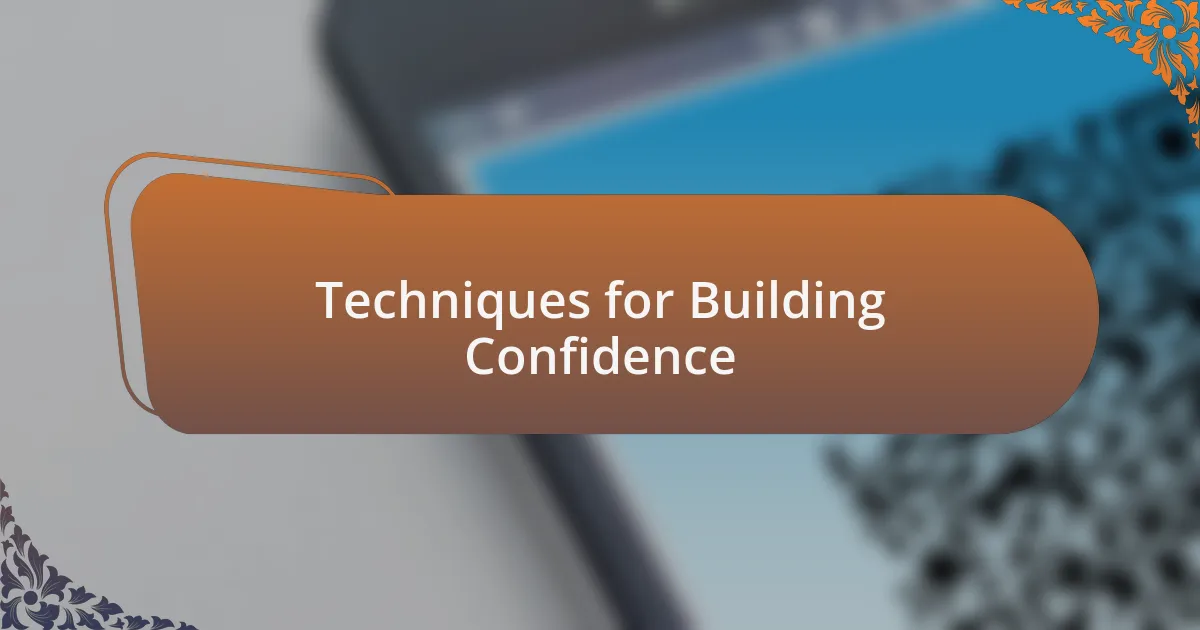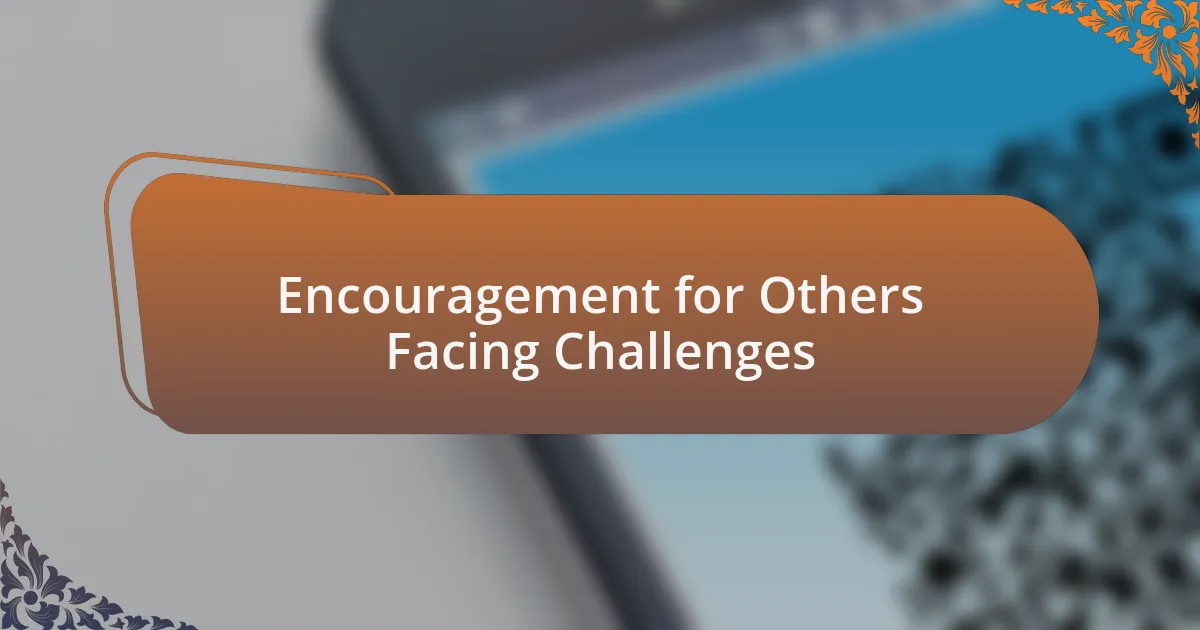Key takeaways:
- Selective mutism is a complex anxiety disorder, often arising from fear and social apprehension, affecting both children and adults.
- Understanding its causes, such as temperament, environment, and past experiences, can help in addressing the condition.
- Effective strategies for overcoming selective mutism include gradual exposure, supportive environments, and mindfulness practices.
- Building confidence through small victories, positive self-talk, and sharing experiences with others is crucial for individuals facing selective mutism.

Understanding Selective Mutism
Selective mutism is more than just refusal to speak; it’s a complex anxiety disorder often rooted in fear and social apprehension. I still remember the suffocating feeling in my stomach whenever I was expected to talk in class. Have you ever felt so anxious that the words just wouldn’t come out, no matter how hard you tried? That’s what selective mutism can do.
This condition usually manifests in children but can extend into adolescence and adulthood, complicating social interactions and relationships. I distinctly recall being at a family gathering, feeling trapped in silence while everyone around me chatted freely. It made me wonder—how do others find the courage to express themselves so easily, while I felt cut off from the conversation?
The triggers for selective mutism can vary widely—ranging from specific environments to certain people. For me, it was primarily speaking to adults that brought on the paralyzing fear. Can you relate to the profound sense of isolation that stems from being unable to share your thoughts? Understanding this struggle is the first step toward empathy and awareness, both for ourselves and others navigating similar waters.

Causes of Selective Mutism
The causes of selective mutism often intertwine with a child’s temperament and environmental factors. For me, growing up in a particularly quiet household made me more susceptible to anxiety in social settings. Do you remember how your surroundings influenced your confidence? It’s fascinating how a nurturing environment can encourage openness, while one that feels stifling can amplify feelings of inadequacy.
Genetics can also play a role, as I’ve learned that some children inherit a predisposition to anxiety. I often wonder if my family’s history of shyness contributed to my own struggles. When I finally understood that factors beyond my control were at play, it brought me a sense of relief. It wasn’t just me; it was a complex mix of nature and nurture.
Additionally, past experiences can significantly shape how a child responds to social situations. I had a particularly embarrassing moment in elementary school, where I froze in front of my classmates during a presentation. Have you ever felt that hot rush of humiliation that just silences you? That moment taught me that trauma, even in small doses, can have a lasting impact on our ability to communicate. Each of these elements, combined, paints a more nuanced picture of selective mutism and its roots.

Impact on Daily Life
Daily life was often a puzzle for me when selective mutism was at its peak. Simple activities like ordering food or answering questions in class felt overwhelming. I vividly remember standing in a coffee shop, sweat gathering on my palms, struggling to muster the courage to speak. Have you ever felt your throat tighten, as if silence were the only safe option?
Social gatherings were another hurdle. I’d sit on the sidelines at birthday parties, watching others engage while I felt trapped in my own bubble of fear. There were times when I longed to join conversations, yet the words would never come. It’s disheartening how isolating this can feel, as if there’s a barrier between you and the enjoyment around you.
Even routine interactions were deeply affected. I saw classmates forming friendships while I clung to my quiet demeanor, feeling like an outsider in a crowd. I think about how those moments shaped my self-image—there’s nothing like the sting of wanting to connect but feeling unseen. In hindsight, I understand that navigating such daily situations was not just challenging; it was a continuous emotional journey.

Effective Strategies for Overcoming
Finding effective strategies to overcome selective mutism was essential for my progress. One of the most powerful techniques I embraced involved gradual exposure. I began by rehearsing simple phrases in front of a mirror, allowing myself to feel comfortable with my own voice. This may sound basic, but when you’re used to silence, even small steps like this can create a significant shift in your confidence. Have you ever experienced a moment when the smallest victory felt monumental?
Another key strategy for me was to seek supportive environments. I remember joining a small group focused on sharing stories—not specifically about selective mutism, but simply sharing. The warmth and understanding from peers who weren’t judging my silence allowed me to experiment with speaking in a low-pressure setting. It’s incredible how a safe space can help unravel the knots of anxiety, wouldn’t you agree?
Finally, integrating mindfulness practices into my routine proved invaluable. Taking quiet moments to breathe and clear my mind helped me regain control in stressful situations. I can’t tell you how often I found myself standing in line, heart racing, until a few deep breaths grounded me. Have you tried simply pausing and noticing your thoughts before responding? It’s amazing how sometimes, just taking a breath can alter the course of your day.

Personal Journey with Selective Mutism
Understanding my own journey with selective mutism has been eye-opening. I vividly remember my first day in kindergarten; the teacher asked me to share my name, and I could only nod. That moment encapsulated my struggle—while I felt the urge to speak, something inside me locked my voice away. Have you ever felt as if words were right there but just out of reach?
Through those early years, I experienced a tug-of-war between wanting to express myself and the suffocating grip of anxiety. One day, I was at a family gathering, surrounded by laughter and conversation. A cousin approached me, asking about my favorite game. I wanted to answer so badly, yet I could only manage a quiet shake of my head. What a frustrating experience that was! It seemed paradoxical; I was filled with thoughts and feelings but unable to share them.
As I got older, I realized that my silence wasn’t a reflection of my identity but rather a barrier. I experimented with journaling to articulate my thoughts, which became surprisingly liberating. Writing allowed me to express what I couldn’t vocalize and propelled me on a path toward healing. Did you ever find a medium that helped you break through your own barriers? For me, it was a revelation; each word penned down was like loosening a knot that had long held me captive.

Techniques for Building Confidence
Building confidence, especially when grappling with selective mutism, often starts with small victories. I can remember the first time I spoke up in a group setting; it felt monumental, like climbing a mountain. I chose to share a thought about a book we were discussing, and to my surprise, everyone listened intently. Have you ever experienced that rush of adrenaline when you finally voice what’s been stuck inside?
Practicing in safe environments can significantly bolster self-esteem. I found role-playing with a trusted friend was incredibly helpful. We would pretend to be in different social situations, such as ordering food at a restaurant or participating in a classroom discussion. Each time I successfully completed a scenario, my confidence grew a little more. Didn’t those small, consistent victories make a noticeable difference in your journey too?
Gradually, I’ve learned that positive self-talk can be a game-changer. Instead of focusing on what could go wrong before speaking, I started reminding myself of my past successes. Every time I took a deep breath and affirmed my ability to contribute, I felt a little less hesitant. Looking back, it’s astonishing how shifting my mindset transformed my interactions. What simple affirmations would work for you?

Encouragement for Others Facing Challenges
Facing challenges like selective mutism can feel isolating, yet I discovered that sharing my journey helped me connect with others. I remember opening up to a friend about my struggles; it was terrifying at first. But when I saw their understanding smile, it dawned on me that vulnerability often breeds support. Have you tried sharing your feelings with someone you trust?
Every little step forward counts, even when it feels insignificant. I still think back to the days when simply raising my hand in class seemed monumental. When I finally did, the sense of relief that washed over me was profound. It’s important to recognize these small achievements; they pave the way for bigger breakthroughs. What tiny victories can you celebrate today?
Moreover, believing in my potential played a crucial role in pushing through my fears. I often kept a journal where I reflected on moments of courage, no matter how small. Revisiting those entries became a powerful reminder that progress takes time, and it’s okay to embrace the journey. How do you acknowledge your strengths on this path?